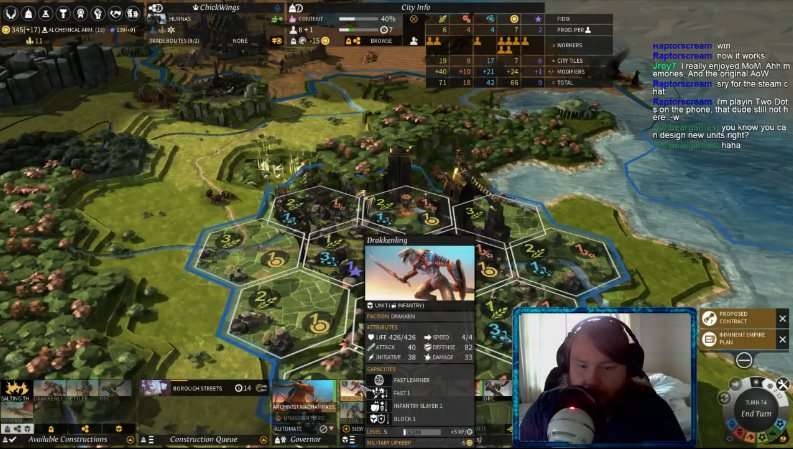'Watching the Game' Has Found a Completely Different Meaning Online
A massive, worldwide audience has developed to watch people play video games, and it's worth billions.

Twitch.tv almost certainly has more viewers per month than any individual cable news network. The game-streaming service boasts more than 55 million visitors per month, all there not to watch talking heads or actors, but their own peers playing video games.
In August, online commerce giant Amazon—which has also moved into online original television show production and distribution—announced it would be acquiring Twitch for nearly $1 billion. The purchase of Twitch by a major online player did not come as a surprise by anybody who follows gaming news. There had been rumblings that YouTube was looking to purchase Twitch and add it to its online empire. But sources say Google's plans were hampered by fears of problems with anti-trust regulations.
The news has prompted media explainers (like this one from Vox) to spread the word to those who didn't know what Twitch was. Given that video games are now the most popular form of entertainment in the world, it feels akin to a media outlet deciding it needs to explain how a rock concert works.
There is some general pop culture surprise that an audience has developed just to watch other people play video games. It can seem a bit odd at first. It's different from watching football or ballet. Most of us can't do those things, at least not well. The whole point of video games is that everybody can play them. Why watch somebody else play when you can just play yourself?
Before getting into the reasons why Twitch is popular it's helpful to remember that video games have also been a very social pastime, even before the rise of Internet social media sharing systems. The loner gamer in the basement was never, ever a stereotype that had roots in accuracy. Arcades were hangouts for teens in the '80s. Home console systems were always designed for multiple players going all the way back to the Atari. Pong was for two players! Video games are things that people actually do together and always have been, and so growing ties between gaming and social media platforms should surprise nobody.
There's been a significant rise in competitive gaming, often referred to as E-Sports. In Reason's look at "Video Game Nation" earlier in the year, we highlighted one heavy-hitter, League of Legends:
The League of Legends community is dominant on Twitch. At any given moment there are tens of thousands of viewers watching some of the top players compete around the world, not just in America. League of Legends producer Riot Games has used Twitch to help build its audience and streams its competitions through the service. The League of Legends world championship series is taking place in September, with a prize pool worth millions. The early rounds are drawing hundreds of thousands of viewers on Twitch. Other major games with a competitive base, like Starcraft II and Street Fighter IV, also have tournaments streamed live through Twitch.
In a sense, watching these games actually is very similar to watching professional football or ballet. While anybody can play these games, it takes a significant amount of skill and proficiency to be really, really good at them. This is not Starcade, that awkward effort from the '80s to make a game show connected to the gaming culture from back in the days of Ms. Pac-Man and Xevious:
Video gamers are no longer kids plunking quarters into arcade machines or trying to avoid being eaten by a grue in early text adventure on an Apple II. Games have become massive spectacles, and developers have worked to manufacture skill-based competitive play within games. Gamers like to watch these streamers to see amazing plays and skilled competition and even learn from what they watch.
But that's not all that goes on at Twitch or other sites that host game-related streamers. Twitch hosts players who stream games as a way to help raise money for charity. It's gaming as a shared philanthropic experience, not unlike the ice bucket challenge to help fund research to fight ALS.
Some streamers develop enough of an audience that they can actually make money from their gameplay, with subscribers actually paying them and streamers making a cut from advertising (just like people with very popular YouTube channels). There are channels where the streamers are draws because of their personalities as much as the games themselves (similar to many YouTube gaming channels). Hosts present live talk shows and video podcasts online discussing video game-related matters.

There are other useful benefits of streaming, not that it needs to be justified for utilitarian reasons. We have reached an era of gaming where the market is flooded with a vast number of choices. There are new video games released every single day. Streamers serve as real-time reviewers allowing potential consumers to see the product in action before they commit their money. It can be a huge boon to indie game developers when something they've made catches on with popular streamers.
Video games have become a spectator sport for a particular niche audience. And given that video games are one of our most popular forms of recreation today, do not be surprised by the size of that audience.
(Full disclosure: I occasionally stream games myself on Twitch.)


Show Comments (1)